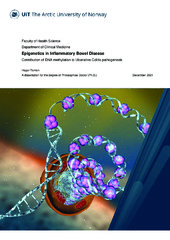| dc.contributor.advisor | Paulssen, Ruth | |
| dc.contributor.author | Taman, Hagar | |
| dc.date.accessioned | 2022-03-22T14:14:55Z | |
| dc.date.available | 2022-03-22T14:14:55Z | |
| dc.date.issued | 2022-04-08 | |
| dc.description.abstract | Ulcerative colitis (UC) is a chronic, inflammatory disease of the gastrointestinal tract, primarily affecting the colon. Along with Crohn’s disease (CD) they constitute the most common subtypes of inflammatory bowel disease (IBD). Genetic variants can only explain approximately 20 % of all IBD cases, indicating a more complex pathogenesis which is not fully understood. It has been implied that an interplay between environmental factors, intestinal microbiome, nutrition, and genetic variation contributes to UC development. It is also suggested that epigenetic modifications might have a role in IBD disease development.
Epigenetic modifications like DNA methylation can regulate gene expression via structural modifications of DNA. The main objective of this work is to investigate if DNA methylation contributes to UC pathogenesis. Newly diagnosed treatment-naïve UC patients with different disease phenotype and healthy controls were included in this study. Next generation sequencing (NGS) technology was applied to obtain transcriptomic and DNA methylation profiles of UC.
Our research shows that DNA methylation profiles differ according to disease severity and gender. The transcriptomic profiles for mild to moderate UC revealed genes regulating tissue-specific pathophysiological properties of tight junctions in the mucosa. Additionally, a gender-dependent pathogenesis of UC could be noted. Genes related to the preservation of mucosal integrity and detoxification of microbial-derived metabolites showed an increased expression in females. Genes related to anti-microbial, and cytotoxicity were found in males, indicating a higher risk for developing colorectal cancer (CRC). Correlations of the transcriptomic and DNA methylation profiles revealed a prominent promoter hypermethylation of genes related to homeostasis and defence, and promoter hypomethylation for genes related to immune response in mild to moderate UC. Surprisingly, the DNA methylation profile for severe UC revealed that hypomethylation were prominent in genes related to anti-inflammatory responses, indicating that hypomethylation might mitigate inflammation during severe UC.
These findings can be potentially useful for developing epigenetic drugs and allow new treatment strategies for UC patients in the future. | en_US |
| dc.description.doctoraltype | ph.d. | en_US |
| dc.description.popularabstract | Inflammatory bowel disease (IBD) affects approximately 6.8 million people worldwide, and more than 1.3 million people in Europe alone. Patients affected with IBD have a significantly reduced quality of life.
IBD is a recurring chronic autoimmune inflammatory disease of the gastrointestinal tract. It consists of two subtypes, Crohn’s disease (CD) and ulcerative colitis (UC). IBD can have a devastating consequence for those affected. IBD is difficult to diagnose, and symptoms include abdominal pain, rectal bleeding, and diarrhoea. Patients can suffer for years before they are diagnosed and treated.
Unfortunately, the causes and mechanisms behind IBD is still not fully understood. Genetics plays a role in disease development; however, it cannot explain the recent increase in disease prevalence. IBD is likely a result of the interplay between genetics, environmental factors, microbiome, and nutrition. Epigenetics, the interaction between genetics and environmental factors has been highlighted as another important factor in IBD.
Epigenetics can temporarily or permanently change gene expression without changing the DNA sequence itself. Epigenetic regulation occurs through different mechanisms, the most studied of these mechanisms is DNA methylation. In our research we wanted to investigate how DNA methylation contributes to UC development.
Next generation sequencing (NGS) technology was used to sequence both DNA and RNA from untreated UC patients and healthy individuals. Comparing UC with healthy controls revealed that DNA methylation differs in disease severity and gender.
In mild UC patients, we found that methylation occurred to a greater extent (hypermethylation) in genes that reduce inflammation thus helping keep the body in balance. In contrast, genes involved in the immune response were less methylated (hypomethylation). Interestingly, in severe UC patients genes involved in anti-inflammatory response were hypomethylated, and therefore they can reduce the inflammation degree. | en_US |
| dc.description.sponsorship | Helse Nord | en_US |
| dc.identifier.uri | https://hdl.handle.net/10037/24490 | |
| dc.language.iso | eng | en_US |
| dc.publisher | UiT The Arctic University of Norway | en_US |
| dc.publisher | UiT Norges arktiske universitet | en_US |
| dc.relation.haspart | <p>Paper I: Taman, H., Fenton, C.G., Hensel, I.V., Anderssen, E., Florholmen, J. & Paulssen, R.H. (2018). Transcriptomic Landscape of Treatment-Naïve Ulcerative Colitis. <i>Journal of Crohn’s and Colitis, 12</i>(3), 327-336. Also available in Munin at <a href=https://hdl.handle.net/10037/12054>https://hdl.handle.net/10037/12054</a>.
<p>Paper II: Taman, H., Fenton, C.G., Hensel, I.V., Anderssen, E., Florholmen, J. & Paulssen, R.H. (2018). Genome-wide DNA Methylation in Treatment-naïve Ulcerative Colitis. <i>Journal of Crohn’s and Colitis, 12</i>(11), 1338-1347. Also available in Munin at <a href=https://hdl.handle.net/10037/14020>https://hdl.handle.net/10037/14020</a>.
<p>Paper III: Taman, H., Fenton, C.G., Anderssen, E., Florholmen, J. & Paulssen, R.H. (2021). DNA hypo-methylation facilitates anti-inflammatory responses in severe ulcerative colitis. <i>PLoS ONE, 16</i>(4), e0248905. Also available in Munin at <a href=https://hdl.handle.net/10037/21777>https://hdl.handle.net/10037/21777</a>. | en_US |
| dc.rights.accessRights | openAccess | en_US |
| dc.rights.holder | Copyright 2022 The Author(s) | |
| dc.rights.uri | https://creativecommons.org/licenses/by-nc-sa/4.0 | en_US |
| dc.rights | Attribution-NonCommercial-ShareAlike 4.0 International (CC BY-NC-SA 4.0) | en_US |
| dc.subject | VDP::Medisinske Fag: 700::Klinisk medisinske fag: 750::Gasteroenterologi: 773 | en_US |
| dc.subject | VDP::Medical disciplines: 700::Clinical medical disciplines: 750::Gastroenterology: 773 | en_US |
| dc.title | Epigenetics in Inflammatory Bowel Disease. Contribution of DNA methylation to Ulcerative Colitis pathogenesis | en_US |
| dc.type | Doctoral thesis | en_US |
| dc.type | Doktorgradsavhandling | en_US |


 English
English norsk
norsk
